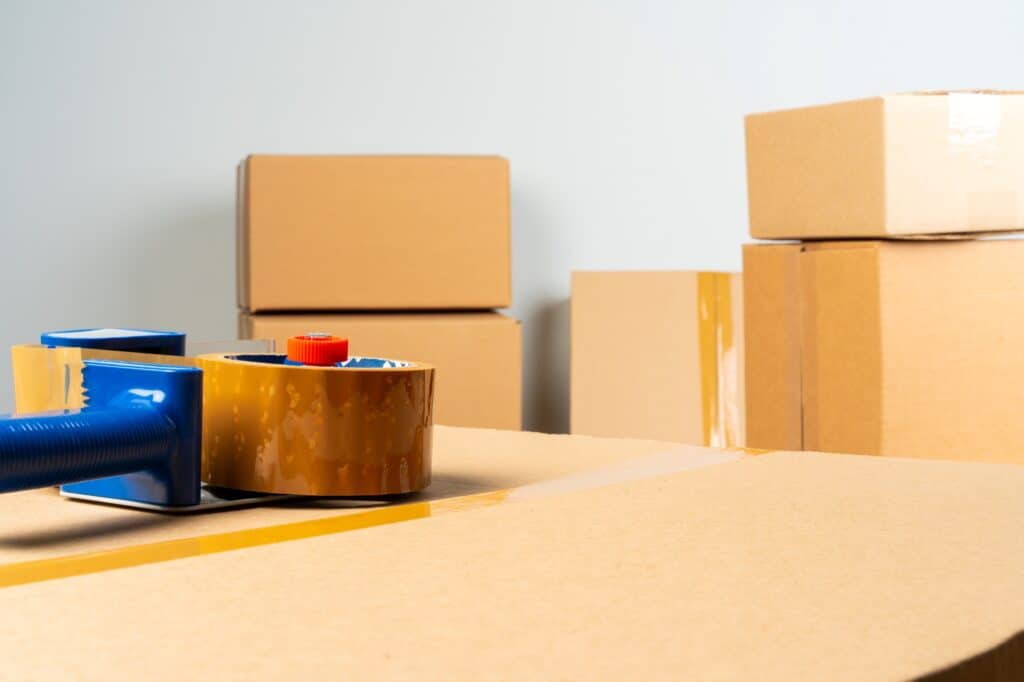Looking to learn how to create a moving checklist for your move to Croydon? This comprehensive guide simplifies the moving process, detailing each crucial step from gathering important documents to handling last-minute tasks with ease. By following this guide, you can ensure that your move is organised and stress-free. From selecting the right moving company to budgeting effectively, we’ve got you covered. Embrace the moving journey with confidence and make your transition to Croydon seamless and enjoyable.
Key Takeaways
- Start your move by gathering important documents and creating a moving binder to stay organised, ensuring you have all the necessary paperwork at hand for a seamless transition.
- Carefully research moving companies and prepare a budget that includes all potential expenses and a contingency fund, so you can avoid unexpected costs and choose a reliable service provider.
- Declutter your belongings early, notify utility companies, and pack essential items separately to ensure a smooth moving day, making the process efficient and stress-free from start to finish.
Gather Important Documents
Begin by gathering all the important documents required for your move. This includes not only personal documents but also essential paperwork related to the move itself. Create a moving binder to organise these documents. This binder should include estimates from moving companies, receipts, and an inventory of your items. Keeping everything in one place will make it easier to stay organised and find what you need quickly.
Store your essential documents in a safe box for easy personal transport. This safe box should include your passports, birth certificates, medical records, and school records. It’s also a good idea to include a mover’s estimate in this box for easy access on a moving day. Keeping these documents accessible prepares you for any situation during the move.
Send your medical records to your new healthcare providers or keep copies handy. This step is crucial for ensuring that you and your family members have seamless access to medical care in your new home. Having these documents organised and safely stored prepares you to tackle the rest of your moving preparations confidently.
Research Moving Companies
Choosing the right moving company is a critical step in your moving house checklist. Research various moving companies and verify their accreditations through the British Association of Removers (BAR) and online reviews. This will help ensure that the company you choose is reputable and reliable.
Choose a moving company that provides a pre-move survey. This survey can prevent unexpected charges by providing an accurate estimate of the moving costs. Local moving expenses can range from £200 to £550, while long-distance moves can average between £400 to £3,000. Knowing these costs upfront can help you budget more effectively.
Consider the experience of the moving company. Look for professional movers who are familiar with the unique challenges of moving, such as handling special items or dealing with permits. Carefully selecting your removal company helps avoid common pitfalls and ensures a smooth moving process.
Create a Moving Budget
Draft a moving budget to cover all potential expenses. Include all upcoming expenses, such as boxes, moving companies, and van rentals, in your budget. Don’t forget to account for the potential impact of time off work, which may affect your monthly income.
… consider potential lodging costs if you need temporary housing before settling into your new home.
It’s also wise to include a contingency amount in your budget, ideally at least 5% of the subtotal. This will cover any unexpected expenses that may arise. In addition, consider potential lodging costs if you need temporary housing before settling into your new home. Careful financial planning ensures a stress-free move without unexpected costs.
Declutter and Sort Belongings
Declutter and sort your belongings early to make the move smoother. Begin the decluttering process early to avoid a last-minute rush and reduce moving costs. Tackling small areas at a time can make the process less overwhelming.
Get family members involved to distribute the workload and make the process engaging. Evaluate how easily items can be replaced when deciding what to keep or discard. Videos of your new home can help assess storage space and guide your decluttering decisions.
Unwanted items can be donated, sold, or recycled, providing responsible disposal options. Hosting a garage sale can help you get rid of items you no longer need while making some extra cash. Decluttering and sorting your belongings makes the packing process more manageable and efficient.
Notify Utility Companies and Services
Notify utility companies and essential services about your move well in advance. Contact your electricity and gas providers early to avoid unnecessary charges. Inform your energy provider about your move at least two days before the moving date.
On a moving day, record your energy meter readings to ensure accurate billing from your previous supplier. After moving, contact the energy supplier at your new home to establish service and avoid default charges.
Update your address with your bank and credit card companies for identity verification purposes. Provide a forwarding address to your old energy supplier to receive your final bill. This step will ensure that you don’t miss any important correspondence and helps in settling any outstanding utility bills.
Keeping these essential services updated will make your transition to your new home smoother.
Order Packing Supplies
Order the right packing supplies to ensure the safe transport of your belongings. Essential packing materials will help protect your belongings during the move. These items include:
- Tote bags
- Cardboard boxes
- Packing tape
- Protective blankets
- Bubble wrap
Speciality boxes such as wardrobe boxes are necessary for transporting clothing while keeping them wrinkle-free. Different types of moving boxes are available, and their prices can vary based on size and supplier. Having the appropriate packing supplies ensures efficient packing.

Start Packing Non-Essential Items
With packing supplies ready, begin packing non-essential items. Identify and gather items that won’t be needed immediately. This includes infrequently used items, which are less likely to be needed before the move.
Use sturdy boxes and packing materials to protect fragile items during the move. Label boxes clearly to indicate the contents and the rooms they belong to for easy unpacking. Packing non-essential items first allows you to gradually pack up without disrupting daily routines.
Arrange School Records Transfer
Arrange the transfer of your children’s school records early. Initiate the transfer process by visiting their current school. This step ensures that the records are accurately and securely transferred to their new school.
Ensure compliance with data protection regulations when sharing school records. This will help safeguard your children’s information during the move. Handling the school records transfer early ensures a smooth transition for your children.
Plan for the Moving Day to Croydon
Planning for moving day is essential. Wake up early on a moving day to get ready for the movers. Please inform your office that you require a day off. The reason for the time off is to oversee the move. Reconfirm arrival times and details with your moving company, and prepare written directions and contact information.
Make sure to have cash or a credit card ready for unexpected expenses during the move. Let friends and family know about the moving date and schedule to see if they can assist. Planning ahead ensures a smooth moving day.
Change of Address
Change your address with all necessary contacts. Notify your employer about your address change for payroll updates. Update your contact information with banks and financial institutions to avoid identity theft.
In addition, inform your medical providers, including doctors and dentists, of your new address. Set up a post office redirect through Royal Mail to temporarily forward mail from your old address.
Ask a neighbour to check your mail and follow up with them after two weeks. These steps ensure all important correspondence reaches your new home.
Pack Essentials Separately
Pack an essentials box for moving day. This box should include items like toiletries, clothes, important documents, and basic kitchen supplies that you may need immediately after moving. These essentials will make the first few days in your new home more comfortable.
Consider packing items in the order of their importance for easier access post-move. Keeping essential items separate avoids the frustration of searching through boxes.
RECOMMENDATION
When creating your moving checklist, prioritise packing an essentials box with items you’ll need immediately. Keeping these necessities separate ensures a smoother first few days in your new home without the hassle of searching through packed boxes.
Final Preparations
In the final days before your move, handle a few last-minute preparations. Empty, clean, and defrost your refrigerator at least 24 hours before moving. This should be done at least 24 hours before moving day. Ensure to perform a thorough cleaning of your old residence before moving out.
Create a checklist of tasks to complete on moving day to stay organised. Confirm moving day arrangements with your solicitor and estate agent. Sign the bill of lading or inventory list and keep a copy before the movers depart. These final steps ensure a smooth transition to your new house.
Summary
Creating a moving checklist simplifies the relocation process, ensuring a smooth transition to your new home in Croydon. Key steps include gathering and organising important documents, researching reputable moving companies, and preparing a detailed budget with a contingency for unexpected costs. Begin decluttering early, notify utility providers, and pack non-essential items in advance using proper packing supplies. Plan for moving day logistics, including address changes and an essentials box for immediate needs. By following this comprehensive guide, you can manage tasks efficiently, minimise stress, and enjoy a seamless move.
Frequently Asked Questions
What documents should I keep in a safe box during the move?
Make sure to keep important documents like passports, birth certificates, medical records, and school records in a safe box during your move. It’s vital to have these essentials secure and accessible!
How do I choose the right moving company?
To choose the right moving company, make sure to check their accreditation, such as with the British Association of Removers (BAR), and look for those that provide a pre-move survey to prevent any surprise fees. This way, you’ll feel more confident about your choice!
What should be included in a moving budget?
To create a solid moving budget, make sure to factor in costs for boxes, moving services, and van rentals, plus a little extra for any surprises. Having that cushion will save you stress down the road!
How can I declutter my home before moving?
To declutter your home before moving, start early and involve your family in the process. Consider donating, selling, or recycling items you no longer need to make the move smoother.
How do I arrange the transfer of my children’s school records?
To arrange the transfer of your children’s school records, simply visit their current school to start the process and make sure to follow any data protection rules in place. It’ll help ensure everything goes smoothly!






